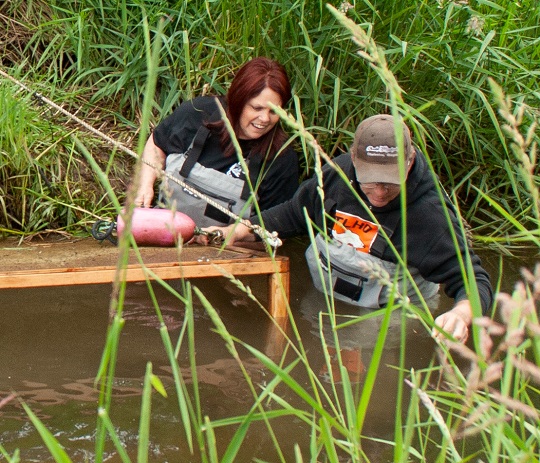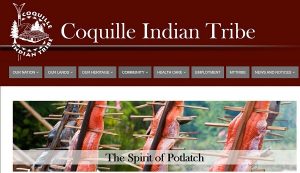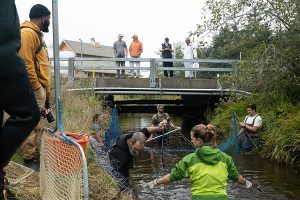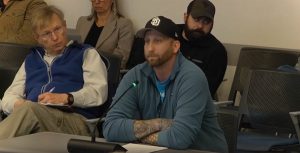‘Think bigger, think holistically, think long-term’
8 min read
Coquille Indian Tribe, Oregon Fish and Wildlife sign historic agreement
A historic agreement between the State of Oregon and the Coquille Indian Tribe.
[00:00:05] Chairman Brenda Meade: My name is Brenda Meade and I’m chairman for the Coquille Indian Tribe and on behalf of the Coquille people, I just want to say real quick, looking behind me, I can feel the energy of our Coquille people here today. If you could just raise your hands, those who are here supporting the Coquille tribe, I feel their energy. So, again, thank you so much for allowing me some opening comments and just really to share with you a little bit about us, about Coquille people, and about how we got here today.
[00:00:36] I first just want to start by sharing a little bit about the Coquille Tribe. It is important to know that the Coquille people have lived in what is now known as Southern Oregon and the Southern Oregon coast, since time began and that is documented as 16,000 years now. We are a blessed people. We continue to be able to live on our ancestral homelands.
[00:00:58] Since time began, Coquille people have hunted, fished, gathered here on this land, and we have been the stewards of these lands and resources as we relied on them for our survival. Protecting and advocating for fish and wildlife and the natural world is our sacred duty as a people.
[00:01:17] Our history is filled with heartache. In 1851 and in 1855, Coquille headmen signed treaties with promises that were never ratified. Our ancestors were later forcibly marched to the Coast Reservation with promises of safety from war, massacre, and the huge influx of white settlement. Many of our ancestors risked their lives and freedom to return to our homelands, to continue their traditional ways.
[00:01:46] And in 1954, our tribe was handed federal policy in the form of the Western Oregon Termination Act, and later other policies that were intended once again to replace our identity and our self-determination as Coquille people with policies to assimilate us and make us go away.
[00:02:08] But we continued to fight to be recognized as the original people of this land, and on June 28, 1989, our tribe celebrated being restored—as a federal recognition—as a sovereign nation once again.
[00:02:22] Restoration gives our tribe both the authority to govern our people, and resources and the responsibility to support the health, well-being, and cultural heritage of Coquille people. This cultural heritage includes enhancement and access to those most important resources: the species, land, water, and resources within our service area, as authorized by the United States Congress.
[00:02:48] Our cultural teachings continue to be, to take only what you need, and leave some for the others. In our tribal laws, we recognize the importance of these traditional foods to the health of our people and the need for access to these foods for subsistency and ceremonial uses.
[00:03:06] And the most important rule that guides this is absolute—no waste. It is important that these resources are abundant for all who live here today and for our next generations as well. These resources allow us to uphold our most important cultural practices and ceremonies that make us Coquille and ensure our survival, and as a potlatch tribe, to help the communities we live in to be healthy as well. That is what this MOA and partnership means to me and my tribe.
[00:03:38] This MOA before you for your consideration is the result of some incredible work from our tribal staff here today. And many even joining us today from the governor’s office, who I must recognize for her support. And for ODF&W and the amazing staff that you have in place, starting with Director Curt Melcher, who took the lead on just thinking about how we could communicate in the best way possible and to challenge us to be talking in the same language. Sometimes we don’t speak the same language and we need to stop and work on that.
[00:04:14] John Q: Chairman Meade said the agreement was motivated by a river in crisis.
[00:04:18] Chairman Brenda Meade: It’s important to know how we got here today. It was in May of 2021 that ODF&W came and met with my tribal council and reported that we would once again see the Coquille River closed to salmon fishing. That was the second year that it was necessary to do so because of the extremely low numbers of returning fall Chinook salmon. The numbers they reported were the lowest return numbers of Chinook salmon for our entire state. We were seeing a 99 percent decrease in 10 years. And the words that they were using there that day were: ‘Near-extinction numbers.’
[00:04:55] They shared a huge list of issues that needed addressed. There were so many. What my council walked away with that day was knowing: Our river’s in crisis. Our tribe responded with a formal declaration of an emergency. We recognized that ODF&W needed our support and our help. Our river needed more boots on the ground, more voices lifted, and more resources than ODF&W had,
[00:05:25] We began to reach out. We began to reach out to all of our community partners. And they have responded. The incredible amount of response and support we have seen in our community: Every single city council on the Coquille River water basin; Port of Coquille, the Port of Bandon; the Port of Coos Bay; all of the partners that came together.
[00:05:48] Coquille STEP has been energized. They are there, boots on the ground, ready to go. We have something on our website that you can go on and volunteer, and we’ve just gotten hundreds of people responding. (Wow!) I just wanted to mention that because I think that it’s the energy that we all need to move forward.
[00:06:09] So we literally got into boats and into the water with ODF&W. This joint effort brought in so many passionate community volunteers, and we started out work to remove invasive bass, gather brood stock for the hatchery Chinook program last fall, and we started calling our congressmen and our senators and the Bureau of Indian Affairs to get their attention to things like Cole Rivers Hatchery issues, about Bandon Hatchery issues, and the funding that we need.
[00:06:40] We’ve tasked our natural resources staff to target federal and private grant resources, federal appropriations, and any source of support we can bring to the table in this partnership. That emergency response on the Coquille River last year caused us and ODF&W and the governor’s office to think bigger, think holistically, and think long-term about a partnership to restore and protect all of our precious fish and wildlife resources in this area. That is what this MOA is about.
[00:07:11] There is too much work for one agency and too few resources if left to only the state. And the truth is, Coquille people have a sacred duty to care for fish and wildlife that aligns with the mission of ODF&W as well. So instead of pointing fingers or making demands or filing lawsuits (like so many do), we chose this MOA partnership as a better path to a future of abundance and sustainability in Oregon.
[00:07:40] John Q: ‘Think bigger, think holistically, and think long-term.’
[00:07:44] Chairman Brenda Meade: This is not just about salmon. We need a more holistic view of all of the issues we are facing. We need to first look at those things we can address immediately and plan for how we will address these harder issues. We also must recognize that there may be some things we cannot change. But we’ll work on those too.
[00:08:06] It is important you know that the tribe in the last few years has committed over $6 million in habitat restoration projects on the Coquille River. About two weeks ago, we received another $2 million in a federal grant for continued habitat work that we are doing in cooperation and support of private landowners.
[00:08:26] The reality is that we cannot focus our efforts on one or two species. We have to work holistically, which means we need more resources and more collaboration. This MOA is not about ODF&W or the (Fish and Wildlife) Commission granting any land claims or exclusive rights to the Coquille Tribe or any other tribe. But this MOA will allow our tribal governments to begin issuing hunting and fishing licenses to our tribal members instead of them carrying a state license.
[00:09:00] As partners, we commit to coordinating every step with ODF&W on how we set our harvests to ensure sustainability and opportunities for everyone. Our MOA requires us to meet and reach agreements on harvest. Neither side can dictate or force the other. That is not our intent.
[00:09:20] And we trust that that’s not ODF&W’s either. The fact is that maybe 200 to 300 tribal members are already out there hunting and fishing. That’s a tiny fraction of all the hunters and anglers in that area. And while we might manage our harvest somewhat differently, it will always be done in coordination with ODF&W.
[00:09:42] The MOA will cover our five-county service area. That’s Coos, Curry, Lane, Douglas, and Jackson counties. That is designated service area approved by Congress in 1989. This is an area where our members are and where the Coquille Indian Tribe is delivering services today and has been for decades.
[00:10:03] In conclusion—and again, I appreciate so much your time—this is partially about the cultural restoration of my tribe, but it is also about our tribal government working with the state as cooperative sovereigns on species restoration; it’s about collaboration and sharing of resources; about the tribe using its federally-recognized status to bring in federal funding and partners to address our challenges; it’s also about working together formally as governments to address the many issues we are seeing with climate change: habitat restoration, water quality improvements, lack of resources, and the overpopulation of invasive species that we are all seeing today.
[00:10:50] These are blessed lands. And it is our belief that this land can give us all we need if we accept our responsibility as stewards, to understand the things we cannot change and to work hard to address those other issues. And I just thank you so much for your time and attention and for, the conversations that will happen as well. Thank you to my, the tribal membership behind me and for their support. This is so important to the Coquille Tribe. And thank you all.
[00:11:23] John Q: Chair Brenda Meade speaking at the June 22 commission meeting, as the Coquille Indian Tribe and the State of Oregon work to bring back fall Chinook from ‘near-extinction numbers.’
Photo: Brenda Meade, chair of the Coquille Tribal Council, left, helps release juvenile Chinook salmon into the Coquille River system on June 15. The juvenile salmon resulted from a spawning project last fall conducted by the tribe and state. Courtesy of the Coquille Indian Tribe and Underscore News.






